Part 1: What’s Big Data? It’s in The Eye of the Beholders.
Run a Google search on “What is Big Data?” and you’ll find over 11 million results. It seems every major IT enterprise has crafted their own definition. Research companies have developed an entirely different set of definitions. Have a discussion with a peer or an associate, and you’ll likely find you each have varying definitions. So what is the true definition? Not to be purposely ambiguous, but It depends. Big Data has actually become an umbrella term for a variety of uses and applications.
Attempting to Define Big Data
Let’s start with the aspect of a Big Data definition according to Wikipedia and Oxford English Dictionary, that most will agree upon from a technical perspective:
“An all-encompassing term for any collection of data sets so large and complex that it becomes difficult to process using on hand data management tools or traditional data processing applications.”
A tech expert would add further clarification that complex data should include both structured and unstructured data.
Forbes recently published an interesting article that cites over a dozen definitions, and then took it a step farther by pulling together 40 different industry thought leaders to see if it was possible to arrive at a single definition. With no surprise, this resulted in nearly 40 different perspectives. However, there was one aspect that each seemed to agree on – the collection of massive data sets.
The actual differences were based on usage and purpose of how the data is being applied. McKinsey researchers may have added a qualifier that all companies, technologists, analysts, and scientists should adhere to – the definition should be left intentionally subjective.
What’s the key learning? Everyone defines Big Data differently.
Don’t assume when you use the term “Big Data” your audience has the same definition – It’s in the eyes of the beholder, and the experience or area of expertise that they’ll interpret.
Unlike the definition, there’s global agreement that “big data” is our new norm, as it’s critical information being leveraged to make any business, small or large, more operationally efficient. The technology experts that are needed to support a “big data” initiative require a variety of skill sets and areas of expertise, that depend not only on how best to extract the data, but also on how the data collection will be used.
In part two of our series, we will breakdown these roles, the skills needed, and the generous compensation that is awarded to those technology experts who have crafted a career to meet the needs of a big data initiative.
At CultureFit. We have built relationships with hundreds of candidates and companies, and invested in a recruiting infrastructure and the advanced technologies needed to run it, so finding the right talent for your business can be as easy as searching through our database. So, instead of wasting valuable time and money on the lengthy process of finding potential tech candidates, talk to one of our IT Staffing Professionals at CultureFit


